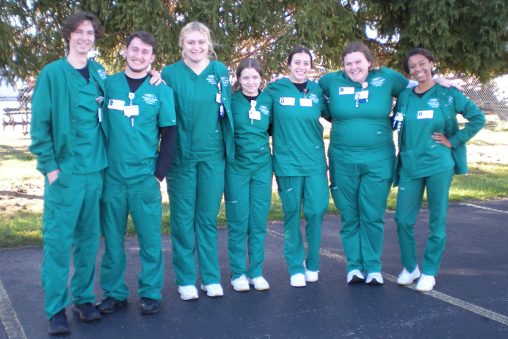
Wright State nursing students will provide Stop the Bleed training at Wilmington High School on Nov. 22 as part of a community study project.
A group of Wright State University nursing students will put their education to good use by teaching others how to staunch the flow of blood in an emergency during a special program in Wilmington.
“Bleeding is the number one cause of death that is preventable after an injury,” said Madelyn Bebko, a senior nursing student from Centerville and president of Wright State’s chapter of the Association of Student Nurses.
Bebko and other nursing students recently underwent training in a course called Stop the Bleed, provided by the American College of Surgeons. Bebko and six of her fellow nursing students are taking that training one step further.
As part of their community study project, they will teach Stop the Bleed to students, staff and community members at Wilmington High School in Clinton County on Nov. 22.
“The goal is that once community members are taught they, in turn, can teach others,” Bebko said. “Once an individual takes the class and hands-on skill training, they are eligible to become an instructor.”
The other senior nursing students participating in this project are Kaylin Avers, Karleigh Godfrey, Kailin Horlacher, Emma Kasprovich, Aniya Lee and Dalton Walter.
Through a series of surveys of Wilmington, the students found that because of the community’s industrial, transportation and socioeconomic bases, there is a risk for personal injury that could be served if more residents know how to stop serious bleeding in an emergency. Teaching the community how to Stop the Bleed was a good fit.
The American College of Surgeons said Stop the Bleed has prepared nearly 4 million people worldwide to stop bleeding in a severely injured person. Someone who is severely bleeding can bleed to death in as little as five minutes. The focus is to put pressure on a wound by hand, pack the wound or use a specially designed tourniquet to stop the bleeding.
“Participants in the Stop the Bleed program feel empowered by the hands-on bleeding control skills they learn,” Bebko said.
She added that through the training, done with mannequins and fake blood, people who have no medical background can learn this life-saving procedure.
While these nursing students will become teachers for a day, they also will be fulfilling a wider role, brought on by their study of Wilmington.
“The students will have a better understanding of how the health of a community directly impacts the health of the patients they will be caring for as registered nurses,” said Harriet Knowles, an adjunct faculty member in Wright State’s School of Nursing.
She emphasizes that “every nurse is a community nurse.”
The students’ project does not end with the Wilmington visit. At the end of the semester, the students will invite those who were interviewed to attend a presentation at Wright State on the study and their experiences with teaching Stop the Bleed.
This project not only benefits the nursing students but also Wright State.
“We’ll be talking to high school seniors, and to those who are looking for a college,” Bebko said. “We’ll be visible and identifying ourselves as with the Wright State School of Nursing. By us doing this training, they can see what Wright State is about.
“Part of being a nurse is educating others,” Bebko added. “It’s important to share the wealth of knowledge we’re getting as nursing students.”

 Wright State celebrates homecoming with week-long block party
Wright State celebrates homecoming with week-long block party  Wright State baseball to take on Dayton Flyers at Day Air Ballpark April 15
Wright State baseball to take on Dayton Flyers at Day Air Ballpark April 15  Wright State joins selective U.S. Space Command Academic Engagement Enterprise
Wright State joins selective U.S. Space Command Academic Engagement Enterprise  Glowing grad
Glowing grad  Wright State’s Homecoming Week features block party-inspired events Feb. 4–7 on the Dayton Campus
Wright State’s Homecoming Week features block party-inspired events Feb. 4–7 on the Dayton Campus 